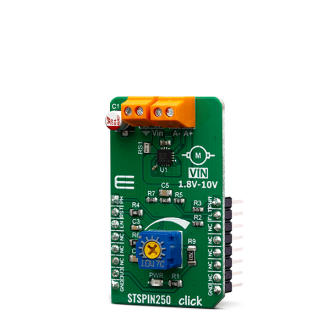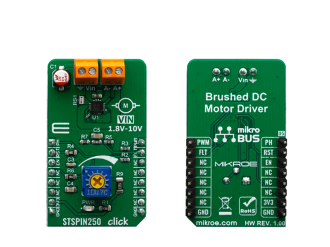
We strongly encourage users to use Package manager for sharing their code on Libstock website, because it boosts your efficiency and leaves the end user with no room for error. [more info]

Rating:
Author: MIKROE
Last Updated: 2019-05-07
Package Version: 1.0.0.0
mikroSDK Library: 1.0.0.0
Category: Brushed
Downloaded: 4947 times
Not followed.
License: MIT license
STSPIN250 click is a brushed DC motor driver with the current limiting and current sensing. It is based on the STSPIN250, a low voltage DC brushed motor driver.
Do you want to subscribe in order to receive notifications regarding "STSPIN250 click" changes.
Do you want to unsubscribe in order to stop receiving notifications regarding "STSPIN250 click" changes.
Do you want to report abuse regarding "STSPIN250 click".


Library Description
Initializes and defines gpio driver and constant values witch can be used in example code, and also performs the chip enable.
Key functions:
Examples description
The application is composed of the three sections :
void applicationTask()
{
// PWM DEMO EXAMPLE
_dutyCycle += 250;
stspin250_pwmSetDuty(_dutyCycle);
if (_dutyCycle > 40000 )
{
_dutyCycle = 0;
stspin250_pwmStop();
Delay_ms(2000);
stspin250_pwmStart();
}
stspin250_setPH(1);
Delay_ms( 200 );
}
Other mikroE Libraries used in the example:
GPIOPWMAdditional notes and informations
Depending on the development board you are using, you may need USB UART click, USB UART 2 click or RS232 click to connect to your PC, for development systems with no UART to USB interface available on the board. The terminal available in all MikroElektronika compilers, or any other terminal application of your choice, can be used to read the message.